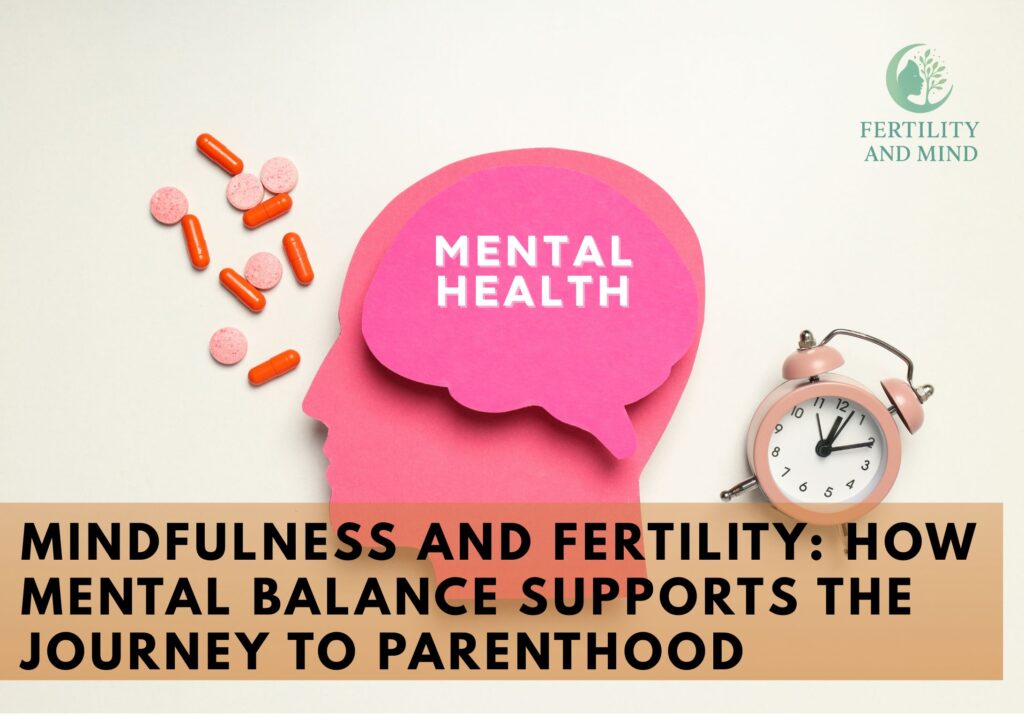
Fertility struggles can be overwhelming, often creating a cycle of stress, anxiety, and uncertainty. While medical treatments such as IVF and fertility drugs are important, an increasing number of studies show that mind body practices, especially mindfulness, can positively influence fertility outcomes. Unlike traditional medical approaches, mindfulness addresses the emotional and psychological side of conception something often overlooked in conventional fertility care.
This article explores the connection between mindfulness and fertility, the science behind it, and how incorporating mindfulness practices can support not just conception, but also pregnancy, family relationships, and overall well-being.
What Is Mindfulness and Why Does It Matter in Fertility?
Mindfulness is the practice of being fully present in the moment, observing thoughts and feelings without judgment. In the context of fertility, it can help break the cycle of stress and fear that many couples experience.
Research shows that chronic stress impacts hormonal balance, ovulation, and sperm quality. By learning to regulate stress through mindfulness, individuals and couples create a healthier internal environment for conception.
Unlike short term relaxation techniques, mindfulness fosters long-lasting emotional resilience, which becomes especially valuable during the ups and downs of fertility treatments.
The Science Linking Mindfulness and Fertility
- Stress reduction: Cortisol, the “stress hormone,” can disrupt menstrual cycles and sperm production. Mindfulness lowers cortisol levels, which supports reproductive health.
- Improved blood flow: Mindful breathing and meditation increase oxygen and blood circulation, which can benefit the reproductive organs.
- Hormonal balance: Stress impacts hormones like FSH, LH, and estrogen. Mindfulness helps regulate these by calming the nervous system.
- Enhanced immune function: Chronic stress weakens immunity, which can impact fertility. Mindfulness supports a healthier immune system.
Several clinical trials have reported that women practicing mindfulness-based programs during IVF had higher success rates, fewer symptoms of depression, and greater emotional stability.
Mindfulness and Pregnancy
Mindfulness is not only relevant during conception but continues to play a vital role during pregnancy. Women who practice mindfulness often experience:
- Reduced anxiety about pregnancy complications.
- Lower risk of prenatal depression.
- Improved sleep and emotional stability.
- A deeper bond with the baby.
By practicing mindfulness and pregnancy techniques, expecting mothers can better manage discomforts such as morning sickness, fatigue, and mood swings. Fathers or partners who practice mindfulness also report stronger emotional connection to the pregnancy.
Mindfulness and Flow in Fertility Journeys
One unique concept often overlooked in fertility discussions is the connection between mindfulness and flow. Flow refers to a state of deep engagement where a person is fully immersed in an activity, losing track of time and external worries.
For couples struggling with infertility, cultivating flow experiences whether through art, sports, yoga, or music can reduce the pressure around conception. Instead of seeing the fertility journey as a mechanical process, flow restores a sense of joy and natural rhythm to life.
This approach is valuable because it shifts the focus away from the “try to conceive stress” and towards holistic well being.
Mindfulness and Family: Strengthening Relationships During Fertility Challenges
Fertility struggles often put strain on relationships. Couples may feel disconnected due to the emotional and financial weight of treatments. Here, mindfulness and family practices become critical.
- Mindful communication: Couples learn to listen without judgment, reducing conflicts.
- Shared meditation: Practicing together creates emotional closeness and lowers tension.
- Mindful parenting preparation: Even before pregnancy, couples can practice mindfulness to align expectations and values.
Mindfulness helps families not only cope with infertility but also prepare for the parenting journey ahead with more patience, empathy, and resilience.
Practical Mindfulness Techniques for Fertility Support
- Mindful Breathing – 10 minutes of slow, deep breathing daily lowers stress hormones.
- Body Scan Meditation – Helps release tension from areas like the abdomen, where stress often accumulates.
- Mindful Journaling – Writing down fears and gratitude creates emotional clarity.
- Yoga and Movement – Combining mindfulness with gentle exercise supports both blood flow and mental balance.
- Visualization – Guided imagery of a calm body and healthy pregnancy can reduce fear and support positive mindset.
- Couples Meditation – Sharing mindfulness practices strengthens intimacy and mutual support.
Information You Won’t Find in Most Articles: The Role of Nutrition and Lifestyle
While most sources focus on stress and psychology, one overlooked aspect is how mindfulness extends to eating habits. Practicing mindful eating paying attention to food quality, taste, and satiety can directly improve fertility.
A diet rich in whole foods, antioxidants, and anti inflammatory nutrients, combined with mindful eating practices, helps reduce food allergies, digestive stress, and hormonal imbalances.
This connection between mindfulness, fertility, and food is often underestimated but plays a powerful role in long-term reproductive health.
Integrating Mindfulness with Medical Fertility Treatments
Mindfulness should not be seen as a replacement for fertility treatments, but as a complementary practice that enhances their effectiveness. Whether undergoing IVF, IUI, or using fertility drugs, patients who incorporate mindfulness often report:
- Less anxiety before and after medical procedures.
- Higher adherence to medical recommendations.
- Greater acceptance of possible outcomes.
Some fertility clinics in the U.S. are now integrating mindfulness-based stress reduction (MBSR) programs into their treatment plans, highlighting its growing recognition in reproductive medicine.
FAQ Section
1. Can mindfulness really improve fertility?
Yes. Mindfulness reduces stress hormones like cortisol, which can interfere with ovulation and sperm quality. By lowering stress, mindfulness supports hormonal balance and reproductive health.
2. How does mindfulness help during pregnancy?
Mindfulness practices reduce anxiety, improve sleep, and help expecting mothers bond with their babies. They also lower the risk of prenatal depression.
3. What is the connection between mindfulness and flow in fertility?
Flow is a state of deep engagement and joy. By practicing mindfulness and flow activities (like yoga, art, or music), couples can reduce the stress and pressure associated with conception.
4. Can mindfulness strengthen family relationships during fertility struggles?
Yes. Mindful communication and shared meditation help couples stay connected, reduce conflicts, and prepare emotionally for parenthood.
5. Should mindfulness replace medical fertility treatments?
No. Mindfulness complements medical approaches like IVF or IUI. It improves emotional resilience, reduces anxiety during procedures, and may increase treatment success rates.
Conclusion
Mindfulness is not a miracle cure, but it is a powerful tool that addresses the emotional, physical, and relational aspects of fertility. From conception to pregnancy and family life, mindfulness provides balance, reduces stress, and creates a healthier foundation for parenthood.
By combining medical fertility treatments with mindfulness practices, couples can approach their journey with greater resilience, deeper connection, and renewed hope.

